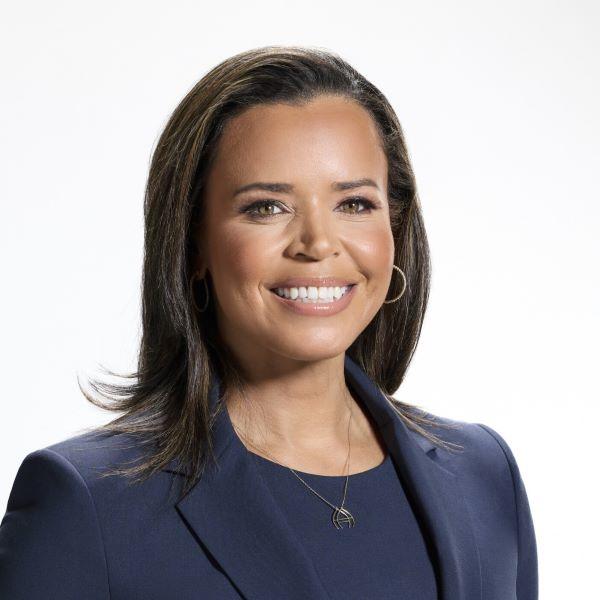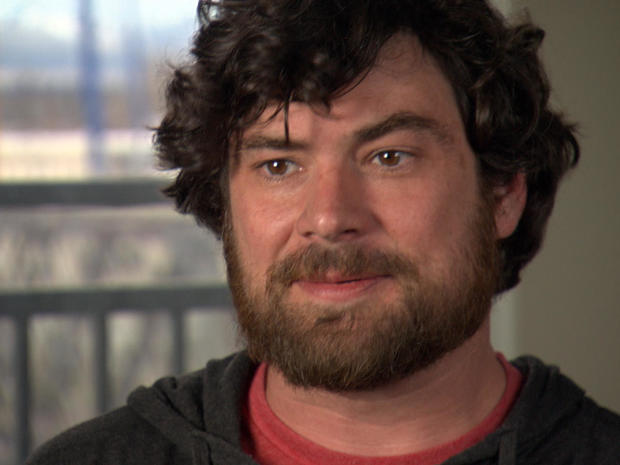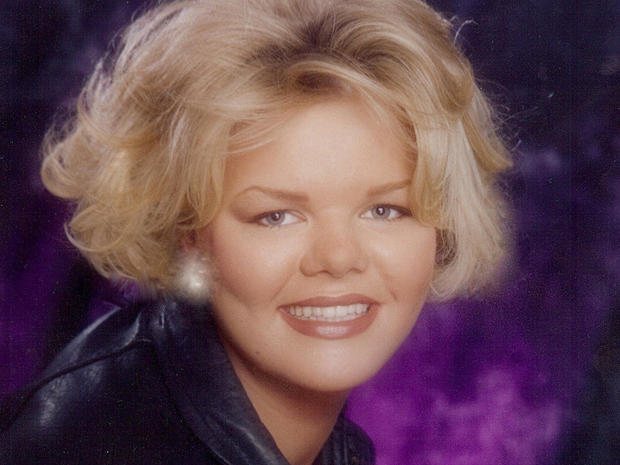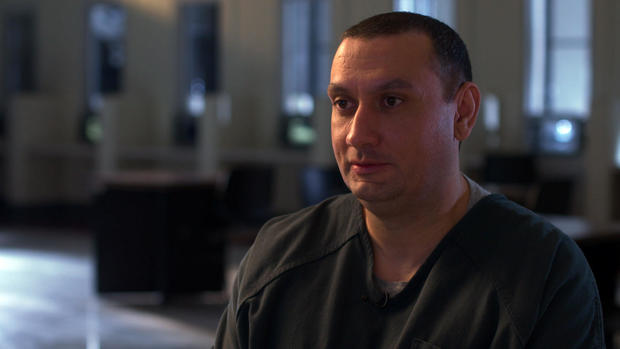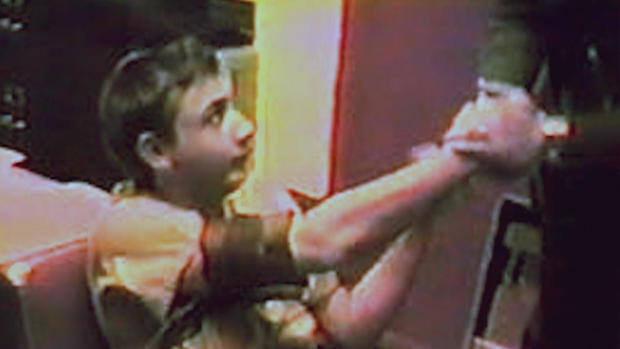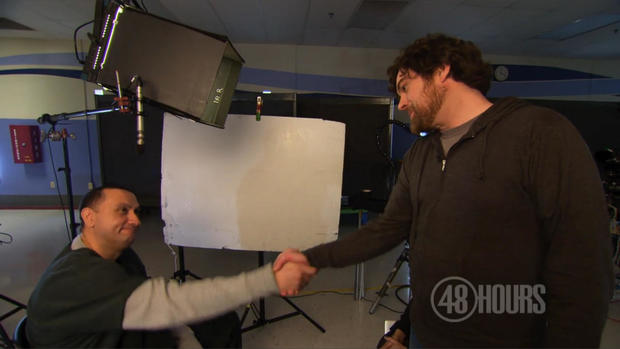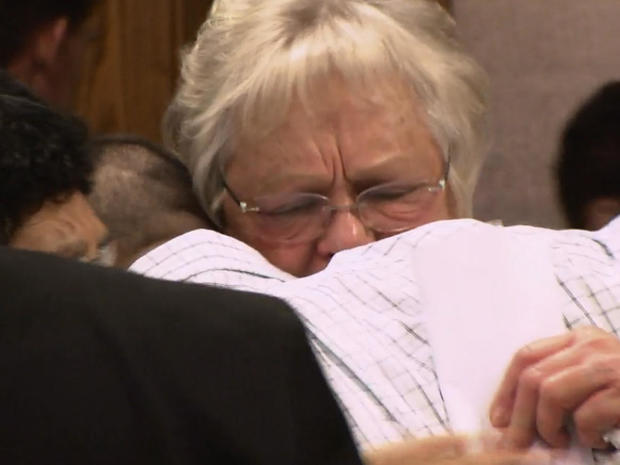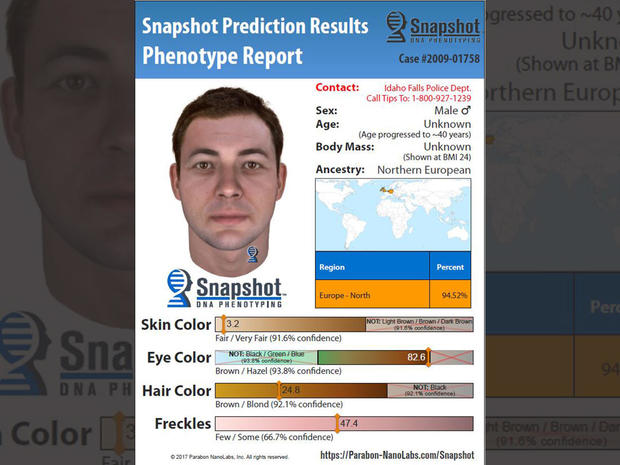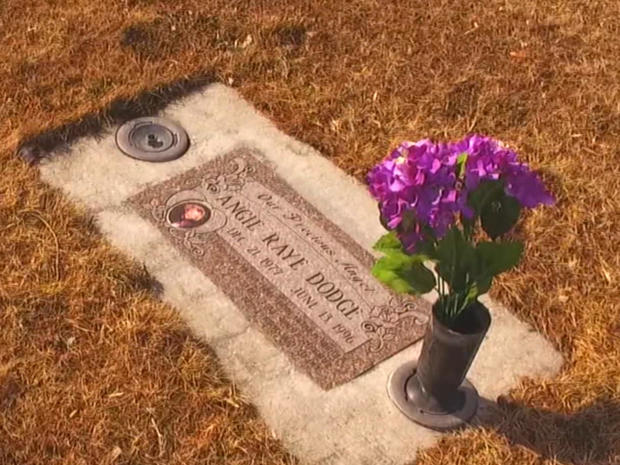Who murdered Idaho teen Angie Dodge?
[This story previously aired on Dec.15, 2017]
Nearly two decades after 18-year-old Angie Dodge was brutally murdered in her Idaho Falls, Idaho, apartment, police were still hunting for the killer who left his DNA at the crime scene, while a man who did not match the DNA was serving a 30-year sentence for participating in the crime.
In 2014, police took a new and very controversial approach to try to find a match to that DNA. They searched a public DNA database owned by Ancestry.com, hoping to find someone related to Angie's killer. They got a close enough match to make them think they had found the killer's family tree – and there they found what they believed to be their man: a young New Orleans filmmaker who happened to have produced a short film about a girl's brutal death.
But was he?
"Nobody every thinks that they're gonna get picked up by the police and taken into an interrogation room and questioned about a murder," filmmaker Michael Usry Jr. told "48 Hours." "When it happens to you, it's definitely a game changer."
Michael Usry Jr: The ability to kill is obviously somewhere in all of us. Because it happens every day across the country.
Michael Usry Jr: Two-and-a-half years ago -- my wife and I, we were livin' in New Orleans … having a good time. …living there in … The Big Easy.
Michael Usry Jr.: And I was working in the movie business. I've produced and had directed a few short films.
Michael Usry Jr: "Murderabilia" got me the reputation of being a person who is really into murder. And things like that.
Michael Usry Jr: My name is Michael Usry. I'm a filmmaker and was a suspect in the Angie Dodge case.
1996 news report: Nineteen-year-old [sic] Angie Dodge was murdered last week, the latest violent crime in Idaho Falls.
Det. Patrick McKenna | Idaho Falls Police Dept.: At least one of the weapons used in it was a knife.
Chief Mark McBride | Idaho Falls Police Dept: As the officers arrived at the crime scene … and found Angie Dodge laying on the ground … And it was obvious that there was a very brutal murder that happened. A lot of blood.
Det. Patrick McKenna: It's sad to see an 18-year-old girl, and see her life taken at the hands of somebody else in this fashion.
Carol Dodge: Angie was my only daughter and she's my baby. …I'll never stop missing her.
Chief Mark McBride: During the investigation we collected all the evidence; we came across a significant amount of DNA that we believe is from the killer.
Anne-Marie Green: Would you say that this crime scene provided really good evidence?
Greg Hampikian | DNA expert: Excellent evidence … You had a neat semen sample.
For nearly two decades police could not find a match to the killer's DNA, so in 2014, they went way outside the box, and searched a public DNA database owned by Ancestry.com.
Carol Dodge: It led us to this Michael Usry Jr. Who just happened to be a filmmaker.
Det. Patrick McKenna: Films of homicide - um kind of a murder mystery filmmaker.
Det. Patrick McKenna: It was pretty creepy. …We had Louisiana State Police call him.
Det. Patrick McKenna: He had agreed to come down to the – state offices there in New Orleans.
Michael Usry Jr.: the majority of the time that I was in the interrogation room, I just didn't know what they were talkin' about. …They finally had to look at me and go … "no we think that you, Michael Usry … we think that you're involved in this murder case."
Det. Patrick McKenna: My whole purpose is to find who killed Angie Dodge.
HOW THE FILMMAKER BECAME A SUSPECT
Carol Dodge: Grief has no time limit … I just can't, I can't let go. …I can't let go of her.
Carol Dodge lost her daughter, Angie, when she was just a teenager.
Carol Dodge: She was just discovering who she truly was … and wanting independence. … she says, "Just let me grow up. … Let me make my own mistakes." You know, "you don't need to watch me," you know, "you don't need to be my shadow."
It was the summer of 1996 in Idaho Falls, Idaho, a mostly Mormon community, where neighbors knew each other by name, and doors were rarely locked, says former Chief of Police Mark McBride.
Chief Mark McBride: It was a very, really a very quiet, peaceful town overall.
Just three weeks before her death, 18-year-old Angie got her own apartment.
Carol Dodge: I saw her the night that she was killed. …She said, "It's so hard growin' up." …and she laid her head on my shoulder and we just kinda rocked back and forth. And … I'm so grateful for that moment … extremely grateful that [crying] my last words were that I love her.
The next morning, Angie didn't show up for work at a local beauty supply store.
Chief Mark McBride: We got a phone call at our 911 center about 11:00 in the morning … and one of her friends at work came to check on her … and the door was unlocked. She went in and she found a body laying there on the floor … and a very bloody crime scene.
There was no sign of forced entry, but there were signs of a struggle.
Anne-Marie Green: You think she fought for her life?
Chief Mark McBride: Yes, I do.
Angie was stabbed and cut 14 times and left half naked. There were no signs of rape, but the killer ejaculated, leaving behind what DNA expert Greg Hampikian calls "a pristine profile."
Greg Hampikian: It's a single profile, complete identification. One man to the exclusion of everyone on the planet.
Police tested the DNA of dozens of local men but couldn't get a match. So, for months, they interviewed everyone Angie knew, including Christopher Tapp. Although his DNA didn't match and he denied any involvement, after more than 28 hours of interrogation over 23 days, Tapp confessed to participating in Angie's murder.
Detective: You were there correct?
Chris Tapp: Correct.
Anne-Marie Green: Did you know Christopher Tapp?
Carol Dodge: No. Didn't know -- had no clue.
Tapp told police that the night of Angie's death he and two friends stopped by her apartment. During an argument, Tapp claimed one of his friends started stabbing Angie while he held her down.
Detective: You're holding her down, OK, while she's being cut, you're holding her down while she's being…
Chris Tapp: Cut.
But when Tapp went before a judge, he pleaded not guilty.
Carol Dodge: I said, "You beast. You horrible beast" … How could he do this to my daughter?
The defense argued Tapp's DNA didn't match the killers, but on May 28, 1998, it took the jury only 13 hours to reach a verdict: guilty.
Nearly two years after Angie Dodge was murdered, Chris Tapp faced his punishment with Carol Dodge glaring at him:
Judge: You are guilty of the crimes of murder in the first degree and rape.
Tapp's sentence: 30 years-to-life. But the murder of Angie Dodge was still an open case. Remember, Chris Tapp did not match the DNA and he wouldn't tell police who did.
Carol Dodge: I just couldn't understand why he would go to prison and take a life sentence and not give the other person up.
Tapp did give authorities several names, including someone named "Mike."
Detective: How sure are you that his first name is Mike?
Chris Tapp: I'm dead positive.
But police could never make a DNA match. So the case went cold, but not for Carol Dodge.
Carol Dodge: I never stop looking for the actual person who matches the DNA. …It's one individual. That's the person I'm looking for.
By 2009, the killer's DNA had been entered into the national criminal database—known as CODIS, but there was still no match. So, Carol Dodge called well-known DNA expert Greg Hampikian.
Greg Hampikian: I had this message. …"They don't know who killed my -- my daughter."
By then, there had been many advances in DNA technology, and with Hampikian's help, Carol Dodge pushed authorities to make use of a controversial new search process called, "familial DNA." It looks for anyone who might be related to Angie's killer.
Greg Hampikian: Which means going into that database in Idaho of the convicted offenders, and looking for a family member that might match this DNA partially.
Erin Murphy: Two places, D.C. and Maryland … passed a law that says no familial searches are allowed.
New York University law professor Erin Murphy wrote "Inside the Cell: The Dark Side of Forensic DNA," and says there's real privacy concerns with familial DNA searches.
Erin Murphy: The states that I think are worried about this are worried about … maybe we can use your DNA to see if your brother's breaking the law or if your dad's breaking the law, or your son's breaking the law.
Idaho doesn't allow familial searches in their criminal database, so Greg Hampikian made an even more controversial suggestion: a familial search through public databases.
It was just this kind of search of familial DNA in a public database, Gedmatch.com, that led to the April arrest of Joseph DeAngelo, the man suspected of being the Golden State Killer -- responsible for least 12 murders and 50 rapes.
Carol Dodge: I'm the one that went to the Idaho Falls Police Department and the prosecution saying … "we need to do this."
Imagine you are one of millions of Americans who have opened a DNA home test kit, spit into a test tube, and then send your DNA to a commercial database. That database now owns your DNA profile and you may not realize it, but police might be able to access it.
Chief Mark McBride: We're interested in solvin' a crime and we're gonna use any technique we can … that we can legally use.
In the summer of 2014, detectives searched a public DNA database owned by Ancestry.com and they got a hit.
Greg Hampikian: I was told they got 34 out of 35 markers.
Anne-Marie Green: Is that good?
Greg Hampikian: Yeah. That's -- that's a good investigative lead.
It was a close enough match to make Det. Patrick McKenna think they had found a relative of Angie's killer. So police got a warrant for Ancestry.com to reveal his identity. It was a man named Michael Usry Sr.
Det. Patrick McKenna: We know it's not that individual or we would have had 35 out of 35 on that, so that's when we started doing research into the family.
That led investigators to suspect Usry's son, Michael Usry Jr.
Detective McKenna wondered if this could be the Mike that Chris Tapp once named:
Det. Patrick McKenna: And then we started researchin' him … and the films that he was making, and it was … a little eerie to think that that could possibly -- possibly be a solid suspect in the case.
A CONFESSION?
Anne-Marie Green: I have to ask you this question. Do you have a particular interest in murder?
Michael Usry Jr.: I -- I don't have a particular interest in murder. You know --
Anne-Marie Green: It sure seems like it, based on your film projects.
Michael Usry Jr.: I know, it does. But no, I -- I really have quite an aversion to it.
But authorities investigating the brutal murder of Angie Dodge weren't so sure.
Michael Usry Jr.: Precisely at 2:00, three gentlemen came to my door.
In December of 2014, more than 18 years after Angie's murder, two detectives from Idaho Falls and a Louisiana State Police officer brought Michael Usry Jr. to a state police office near the New Orleans Superdome and started grilling him.
Michael Usry Jr.: They said, "So what about your travels to Idaho. Have you ever been to Idaho?" … I had, in fact. … I actually went up there with some friends for just one night.
He was 19 years old back then, and he and his friends drove to Rexburg, Idaho, passing right through Idaho Falls.
Michael Usry Jr.: Well, they were really interested in that.
Det. Patrick McKenna: …we were a little surprised that … we're able to actually place him in Idaho Falls.
It was a big red flag for Det. Patrick McKenna.
Michael Usry Jr.: It's kinda weird. But I just really didn't -- didn't get it.
Then one of the officers pulled out a warrant and swabbed his cheek for DNA.
Michael Usry Jr.: …the biggest law enforcement guy I've ever seen in my life. ... at that point, I went, "Hey, what -- what's goin' on here, you guys? Should I get a lawyer?"
Once they had his DNA, they drove Michael Usry home without any explanation.
Michael Usry Jr.: I just basically stood on my sidewalk in a daze.
It was a call to a close friend that finally shed some light.
Michael Usry Jr.: And, he said, "Well, what's the case? What is this?" …And I go, "Well, they wouldn't tell me anything except that it was a high-profile murder case in Idaho Falls." So he gets on the computer. …And within 20 seconds he's like, "Oh yeah, this is the case right here. It's some girl named Angie Dodge."
The filmmaker, whose movie featured a convict describing how he stabbed a woman to death, was now suspected of doing just that to Angie Dodge.
Michael Usry Jr.: I mean it was very much a case of an overkill. They stabbed her … cut her … it was just a butchery … People were like, "Wow … what does this imply for your career … for your life, for your family? For your family's name?"
Usry remembers being terrified, spending days holed up at home worried what police would do next.
Michael Usry Jr.: …pretty sure that they were tapping my phone calls -- possibly staking me out … certainly checking my computer searches.
Also anxious, four states away, was Carol Dodge, Angie's mother, who prayed this new lead would finally unmask the killer who left his DNA at the scene.
Carol Dodge: She deserves justice … all victims deserve justice.
But Usry knew he hadn't killed anyone. And he wanted answers. A local newspaper reporter showed him a copy of the warrant investigators used to obtain his DNA.
And right there was the answer to the question: why him?
Michael Usry Jr.: And I went, "Wow, this was because of my dad."
Fifteen years ago, the filmmaker's father, Michael Usry Sr., participated in a genealogy project at his local church. A sample of his DNA went to that public database which was later purchased by Ancestry.com. And that's where police came across it.
Michael Usry Jr.: There are 34 out of 35 alleles that match. … It seems shocking to me. You know? Thirty-four out of 35. I mean that's a great number, right. I mean, who wouldn't be, you know, drawn to that?
Thirty-four out of 35 DNA markers sounds like a stunningly close match to Angie Dodge's killer. But the reasons police honed in on him instead of any of his other relatives are detailed in the warrant. Remember, Chris Tapp told police a guy named Mike was involved in the murder. Police took to Facebook and found Usry's profile. Bingo. Facebook showed he had friends living in the Idaho Falls area. And then there's Usry's films.
The more Usry read, the more furious he grew that anyone would think he was a killer.
Erin Murphy is an NYU law professor.
Erin Murphy: It would be torture… I mean, most people would not be able to just continue sailing through their day if they were under suspicion for a rape homicide.
Erin Murphy: I mean someone who is in a sensitive position like a teacher or a doctor … can't just go on their daily business. …I don't think my dean would be pleased if I was coming to work with students every day under investigation for a homicide … are people going to wonder if I'm a killer?"
Anne-Marie Green: You know you're not the killer.
Michael Usry Jr.: Right.
Erin Murphy: If you Google his name …one of the first things that comes up is this … Mike's now forever associated with this very serious and gruesome incident.
Anne-Marie Green: Do you start to think … "maybe someone in my family's the killer?"
Michael Usry Jr.: How could I not think it.
WAS TAPP'S CONFESSION COERCED?
Michael Usry worried every day. He knew that Idaho Falls Police suspected him of murdering Angie Dodge, and the uncertainty of what would happen next kept him up at night until Jan. 13, 2015 -- more than a month later.
Michael Usry Jr.: They sent me an e-mail … and it says, "Michael Usry Junior, we just wanted to let you know that your DNA did not match our crime scene DNA, something you already knew."
In an email from police, Michael Usry Jr. was officially cleared of the murder of Angie Dodge. But he was still thoroughly traumatized.
Anne-Marie Green: You were angry at Ancestry.
Michael Usry Jr.: I was angry at everybody … the police -- scientists, you know, these database companies, you know … how could they misfire so bad?
"48 Hours" asked Ancestry.com about Usry's experience. In a statement a company spokesperson replied:
"Ancestry understands the responsibility that comes with the trust our customers place in us and protecting their privacy is among our highest priorities. Ancestry will not share any information with law enforcement unless compelled to by valid legal process, such as a court order or search warrant. The Usry case was unique. It involved a database we purchased that was an open and publicly available research resource at the time we bought it. After this case, we made the database private to help protect the privacy of our customers. This is also the only formal legal request for DNA related information we have received, as indicated in our transparency reports."
But "48 Hours" wondered, could what happened to Michael Usry Jr. happen again to someone else, with police using another public database? To our surprise, law professor Erin Murphy says maybe.
Erin Murphy: These cases tend only to come to light when … something goes wrong.
Anne-Marie Green: So you might never know if police checked your DNA to look for a criminal?
Erin Murphy: Yeah … most of them don't have to tell us, "How many times have you done these searches? How many people did you investigate without them even knowing?"
Usry decided the best way to prevent it from happening again was to go public with what happened to him in a documentary. He was shocked when Angie Dodge's mother was willing to talk. What he didn't realize was Carol Dodge had an agenda of her own.
Michael Usry Jr.: She's fairly certain that a killer is in my bloodline.
Anne-Marie Green: Do you believe Mike Usry is related to the killer of your daughter?
Carol Dodge: Somehow.
Despite all that, Carol Dodge and Michael Usry have forged a rather odd close bond. And after hearing Carol and Angie's story, the focus of Usry's documentary changed dramatically – to Dodge's search for her daughter's killer.
Michael Usry Jr.: I thought that a better, a more productive thing to do would be to try to make a film to try to bring attention to this.
Usry wanted to help Carol Dodge, so he immersed himself in the case, starting with the man who had confessed: Chris Tapp.
Detective: How many times did he stab her before you let go?
Chris Tapp: That first time.
Usry quickly learned that Chris Tapp was now claiming that his confession was forced, and that the Idaho Innocence Project headed by that DNA expert, Greg Hampikian, was now working to set Tapp free.
Anne-Marie Green: Based on the DNA, is there any way that Chris could've been in that room?
Greg Hampikian: No, not based on the DNA.
The more Carol Dodge learned about DNA, the more she questioned Tapp's confession: that he held Angie down while she was being stabbed.
Carol Dodge: It wasn't until I started studying science that I said, "It's impossible." …How could Chris admit in doing what he said he did, and there be no physical evidence?
But it wasn't just the science that bothered Dr. Hampikian. He believes that Chris Tapp's confession was coerced by the detectives who interrogated him.
Detective Fuhriman: Come on man. You're in the heat of the moment. She's putting up a fight. …You know you're caught. You're right there in the middle.
Chris Tapp: I watch it and it's so frustrating.
At 40 years old, Chris Tapp had been Inmate No. 56265 for 20 years.
Chris Tapp: You look at that 20-year-old kid, you know, and you realize, God, I was just an idiot.
Detective: Think hard about it. I know it's there. I know it's there.
Tapp says his confession was a lie -- a story fed to him by police and then forced back out of him, on tape.
Chris Tapp: You can see 'em specifically pointin' out facts to me. Or -- or giving little innuendos.
Detective: This would be the stairs going up. So you went up these stairs, OK.
Chris Tapp: …or hints of how the murder went down.
Detective: This porch goes outside….
It all began six months after Angie's murder, when one of her friends, Ben Hobbs, was arrested in Las Vegas for sexually assaulting a woman at knifepoint. Idaho Falls detectives had already questioned and cleared Hobbs, but because the crime he committed in Las Vegas was so similar, they wondered if he might Angie's killer. So while Hobbs remained in custody in Nevada, detectives brought in his best friend for questioning: Chris Tapp.
Chris Tapp: Emphatically I said, "I had nothing to do with it. I don't know what you're talking about."
Chris Tapp [laughing with detective]: I know, there's no way.
But instead of leaving it at that, Tapp cooperated.
Chris Tapp: I felt like trust 'em, they're not gonna do anything wrong.
Greg Hampikian: He doesn't know they can lie to him. …Most innocent people have no idea that the interrogators can lie to you.
First, Tapp was told that there was irrefutable evidence that his friend, Ben Hobbs, killed Angie Dodge and that Tapp was there when it happened:
Detective: We're pretty sure we know what happened and who did what, how, when, where, why…
Tapp kept denying all knowledge of the crime:
Detective: Did you hear her scream. Or anything like that?
Chris Tapp: I wasn't there…
But detectives persisted, and, even though he had a lawyer, Tapp kept talking.
Anne Marie Green: And so when they offered you a polygraph, seemed like a good idea?
Chris Tapp: Yeah. Seemed like a great idea. I had nothin' to hide, no-- no reason not to do it.
But Tapp was told he was being deceptive. Detectives promised him full immunity – no jail time -- in exchange for the truth as long as he didn't participate in the actual murder. That's when Tapp says he started telling police what he thought they wanted to hear:
Det. Fuhriman: Now are you sure Ben's there?
Chris Tapp: Yes.
Det. Fuhriman: Positive?
Chris Tapp: Yes.
Detective: OK.
Tapp told detectives he was there when Ben Hobbs killed Angie Dodge:
Detective: You told him don't do it, don't do it?
Chris Tapp: Yeah.
Detective: Did he have the knife then? …Pardon?
Chris Tapp: Yeah.
Then, just hours later, a shocking twist. Detectives learned that Ben Hobbs did not match the killer's DNA. Tapp was told there was now evidence that a third man was at Angie's apartment that night: Jeremy Sargis, a friend of Tapp and Hobbs. Ninety minutes later, Tapp was blaming Sargis for Angie's murder.
Chris Tapp: I continued to lie, I continued to give 'em -- story after story….They shoulda just stopped. But they didn't.
Anne-Marie Green: But Chris, why didn't you stop?
Chris Tapp: I didn't think I could.
Detectives tested Jeremy Sargis' DNA and it was also not a match.
Chris Tapp: And when Jer's DNA came back is the day they voided my immunity agreement, ripped everything up, and told me I'm the humungous, you know, liar.
That's when Chris Tapp says police pushed him to change his story, one last time. After 23 days and seven interrogations, Tapp confessed to participating in Angie's murder.
Detective: You're holding her down, OK … while she's being cut.
Detective: You're holding her down, while she's being…
Chris Tapp: Cut.
Chris Tapp: That's what was the end of it all. That's what brought me to prison.
Authorities have repeatedly dismissed Tapp's claims of a forced confession, until 2016, when a shocking discovery would change the game. Never-before-seen videotapes of seven polygraph exams administered to Chris Tapp -- tapes that convinced even Carol Dodge that Tapp is innocent.
Carol Dodge: Chris Tapp basically just got railroaded.
Carol Dodge took on a new mission: to free the man convicted of her daughter's murder and find the killer who left his DNA -- even if it turned out to be a member of Michael Usry's family.
NEW EVIDENCE
As Michael Usry began looking into the Angie Dodge murder case, he had preconceived notions.
Michael Usry Jr.: Why would you confess to sumthin' that you didn't do? I wouldn't do that.
Anne-Marie Green: And now what do you think?
Michael Usry Jr.: That it's possible, that anybody could do it.
Now Usry believes that Chris Tapp was forced to confess to a crime he didn't commit and condemned to a place where he doesn't belong.
Chris Tapp: You always gotta have a little faith. Gotta have a little hope. …And I haven't accepted this as my end.
Judge Michael Heavey: I can't imagine spending one day in prison, let alone 20-plus years.
Michael Heavey is a retired superior court judge who believes so strongly that Chris Tapp is innocent, he's spent the last four years trying to help prove it.
Judge Michael Heavey: When you look at the interrogation videos, he knows nothing.
Detective: So Chris Tapp, Ben Hobbs. Let it out. Let it out!
Judge Michael Heavey: He struggles for details.
Detective: You're there.
Judge Michael Heavey: Why? 'Cause he wasn't there.
Heavey runs a wrongful conviction project called "Judges for Justice," and took on Tapp's case after watching the interrogation tapes.
Chris Tapp [interrogation]: I wasn't scared. I wasn't even down the f---ing stairs. I wasn't nowhere around.
Judge Heavey became convinced that Chris Tapp had been coerced into changing his story an astounding six times and knew that something was missing.
Judge Michael Heavey: 'Cause I was concerned how he went from one day saying…
Chris Tapp [interrogation]: I wasn't there!
Judge Michael Heavey: … and the next day …
Detective: You're standing above her like this, like her head's right here.
Chris Tapp: Yeah.
Judge Michael Heavey: "I'm at the crime scene and I stabbed her." I couldn't see how he made that jump. So I went back to look at the polygraph. And my jaw just dropped.
Chris Tapp [polygraph]: Does it help to say I'm nervous?
In between Tapp's nine interrogations, detectives also administered seven polygraph exams. All of them were recorded, but no one had ever bothered to look at the tapes because polygraphs are inadmissible in court. And the sound is barely audible.
Detective: I have to advise you of your rights.
Chris Tapp: OK.
Judge Michael Heavey: Polygraphs are typically used to assess the credibility of the witness, when they're done honestly.
Anne-Marie Green: And how was the polygraph used in this case?
Judge Michael Heavey: This case it was used to … trick Chris Tapp into giving false testimony. …my polygraph expert says it was used like a psychological rubber hose. …they beat him up with the psychology of it all … to coerce him into falsely accusing other people. They manufactured testimony … to get him to implicate himself in the murder of Angie Dodge.
Judge Heavey says that detectives in this case broke the rules in the polygraph room and thought no one would ever notice.
Judge Michael Heavey: The United States Supreme Court has held … that it's improper to threaten. …you can't threaten because it leads to false confessions. …they threatened him with the gas chamber, being accessory to murder, and being a conspirator to murder.
Detective [polygraph]: You know what accessory to murder is?
Chris Tapp: No.
Detective: That's being charged just like the person who did it; they get life in prison, gas chamber.
Judge Michael Heavey: They figured no one's gonna look at the polygraphs. So it'll be hidden, no one will ever see it.
Heavey says Chris Tapp was brainwashed.
Detective to Chris Tapp [polygraph]: You're scared. The reason why is because you -- subconsciously, you remember.
Judge Michael Heavey: Chris Tapp eventually comes to believe that the polygraph is an all-knowing scientific instrument that can read his subconscious and is telling the machine that he was at the crime.
Detective to Chris Tapp [polygraph]: Protect your own ass. …I wouldn't say this, but you're not a cold-blooded killer. You got trapped.
Chris Tapp: [Takes deep breath] Alright.
Judge Michael Heavey: Chris finally says, "Yes -- I stabbed her because Ben threatened me." And then Chris said …
Chris Tapp: Did I do it?
Judge Michael Heavey: And the police officer walks over and says, "Give me your hand" … like, he passed the polygraph.
Judge Michael Heavey: And that gets Chris Tapp 30 years-to- life, charged with the death penalty. Ugly stuff.
Anne-Marie Green: Do you remember that moment?
Chris Tapp: Yeah. [laughs] Yeah. Scared. Scared. … That's pretty much the day my life ended.
But Tapp never told anyone what happened during those polygraph exams.
Chris Tapp: I didn't know what they did in the polygraph tapes was wrong. I didn't know. If I woulda known these things 20 years, 15, 10 years ago, then maybe we wouldn't be here today.
Idaho Falls Police deny any wrongdoing in their interrogations or polygraph exams.
Anne-Marie Green: Do you think the polygraph was used as a coercive tool?
Chief Mark McBride: [Pauses] Well, I don't know that was the intent. I think the intent is find out the truth.
Over the years, the courts have upheld Tapp's confession as valid and admissible and not the product of coercive police conduct.
Chief Mark McBride: I don't think they were tryin' to cause harm. …there wasn't any malicious intent, I don't think.
John Thomas: It's hard for me to wrap my head around what the police are thinking.
John Thomas is Chris Tapp's appellate attorney.
John Thomas: It's OK. You made a mistake. …Just say, "Hey, I made a mistake. We got the wrong guy. Let's all rally around and let's get the right guy."
Mike Heavey was hoping that the newly discovered polygraph tapes would be enough for a judge to grant Chris Tapp a new trial.
Judge Michael Heavey: Those polygraph videos are now new evidence …They're the wedge to get Chris in front of a judge to see the coercion that went on. The polygraphs are … the answer … to getting him out.
Anne-Marie Green: What's your biggest fear when it comes to this case?
Michael Usry Jr.: [Sighs] I guess my biggest fear of this entire case would be that it just continues on indefinitely and Chris stays in jail, Carol continues to search.
Carol Dodge: I hope he walks out a free man.
Anne-Marie Green: It's not often you hear the mother of a victim say that about the only man serving time for her daughter's murder.
Carol Dodge: True.
JOURNEY TO JUSTICE
For the first time ever, Michael Usry was about to come face-to-face with Chris Tapp, the man convicted of killing Angie Dodge, and interview him for his film.
Michael Usry Jr.: Why did you confess?
Chris Tapp: To give 'em what they wanted. …To do whatever it took for me to go home.
The day they met, Tapp was only weeks away from two hearings that his lawyer, John Thomas, hoped would set him free.
John Thomas: We have too much evidence showing that Chris Tapp wasn't there.
Chris Tapp: I'm innocent.
Anne-Marie Green: Have you ever found DNA that matched Chris Tapp at the scene?
Chief Mark McBride: No.
Former Police Chief Mark McBride maintains that given Tapp's confession … the absence of his DNA at the crime scene proves nothing.
Detective: You're holding her down while she's being…
Chris Tapp: Cut.
Then a stunning turn of events. The District Attorney's Office wanted to make a deal. Tapp's murder conviction would stand, but the rape conviction would be expunged and there would be no probation.
John Thomas: Chris Tapp would just take his lumps on his 20 years and … walk a free man.
Unwilling to risk another 10 years in prison, Tapp took the deal.
John Thomas: There were too many what-ifs. …We had had a number of post-conviction petitions before and all of them had been denied.
The next day, a "48 Hours" producer followed John Thomas as he sped to the county jail -- paperwork in hand.
John Thomas: We are headed to the jail to get Chris to review the plea agreement. And if he reviews it and agrees with it, I will sign it. …And he'll be out of prison for the rest of his life.
John Thomas: Got it signed. Signed and sealed.
48 hours later, Tapp supporters Greg Hampikian, Michael Heavey and even Michael Usry, had made it to Idaho Falls for an emergency hearing.
A little over two decades from the day Chris Tapp was first arrested, he walked into the courtroom one more time in handcuffs.
And after some legal formalities…
Judge Alan Stevens to Chris Tapp: Did you read the stipulation, every line of it, before you signed it?
Carol Dodge was called on to make a victim impact statement on behalf of her daughter, Angie.
Carol Dodge: I stand here today not as a victim, but I am a survivor of a horrific crime that took my daughter's life.
Chris Tapp fought back tears.
Carol Dodge: I can't tell you of all of the people that are victims. And I hope you will help me find justice for Angie…
But it was clear that along with her daughter, Carol Dodge considers Chris Tapp another victim in this endless tragedy.
Carol Dodge to Chris Tapp: I'm extremely happy for you that you have your life back.
But the judge still had to sign off on the deal. And then, with just a few words, Judge Alan Stephens set Chris Tapp free.
Judge Alan Stephens: … and I do accept the stipulation…
Tapp's handcuffs were removed, and Carol Dodge was the first to hold him in her arms.
Just feet away from the celebration, the hunt for Angie Dodge's killer continued.
Michael Usry Jr.: I got a tap on the shoulder from one of the bailiffs. And he said that Detective McKenna wanted to talk to me.
Detective McKenna showed Michael Usry a sketch of Angie's killer made with new technology that claims to recreate facial features using DNA.
Michael Usry Jr.: When he showed me the sketch, there was a split second where I really had this fear that I would actually recognize this person.
But Usry was, once again, a dead end; it was not a face he knew.
Michael Usry Jr.: There was a little bit of relief when I saw the composite sketch because I have never believed that someone in my family … could be involved in a crime like this.
Erin Murphy: It's highly likely that his family has nothing to do with this crime at all.
While police still believed Usry's family tree contains a killer, law professor Erin Murphy disagreed.
Erin Murphy: Ninety-nine-percent of people match to one another on the genome. So I will match someone who lives on the other side of the globe, who has no direct genetic connection to me whatsoever just because we are human beings. …So what's really important to ask is, "What's the quality of the match? How much information did you look at?"
As it turns out, Professor Murphy was right. On Wednesday, July 12, 2017, Idaho Falls police put out a press release stating that they "took the DNA testing to the next level" and "recently received a DNA report that clears Michael Usry Jr. and his family of involvement in the Angie Dodge homicide case."
The report from the DNA lab also stated that they were "87.63 percent confident that the unknown DNA from the Angie Dodge crime scene did not match the Usry family."
Carol Dodge must now find the strength to keep going.
Carol Dodge: [You] have to be really strong to continue the journey to justice.
Michael Usry Jr.: I don't know how she goes on, and yet I can understand how she could never quit.
Carol Dodge is worried that police will not catch Angie's killer if they remain focused on their theory of the crime, that Chris Tapp and two of his friends killed Angie.
Carol Dodge: I hope that they can now go forward and get over the Chris Tapp box. And stop looking for two to three people when we just have one DNA.
Everyone involved in the case has vowed to never stop searching for the man who murdered Angie Dodge -- even the young filmmaker once suspected of being her killer.
Anne-Marie Green: You could have walked away.
Michael Usry Jr.: And I probably would have … I continue to stick with it because … mainly because of Carol Dodge. … I want to help her. I love Carol. …we're in it together.
Idaho Falls police say the investigation into Angie Dodge's murder is ongoing.
Produced by Judy Rybak, Elena DiFiore, Lindsey Schwartz and Chris O'Connell
